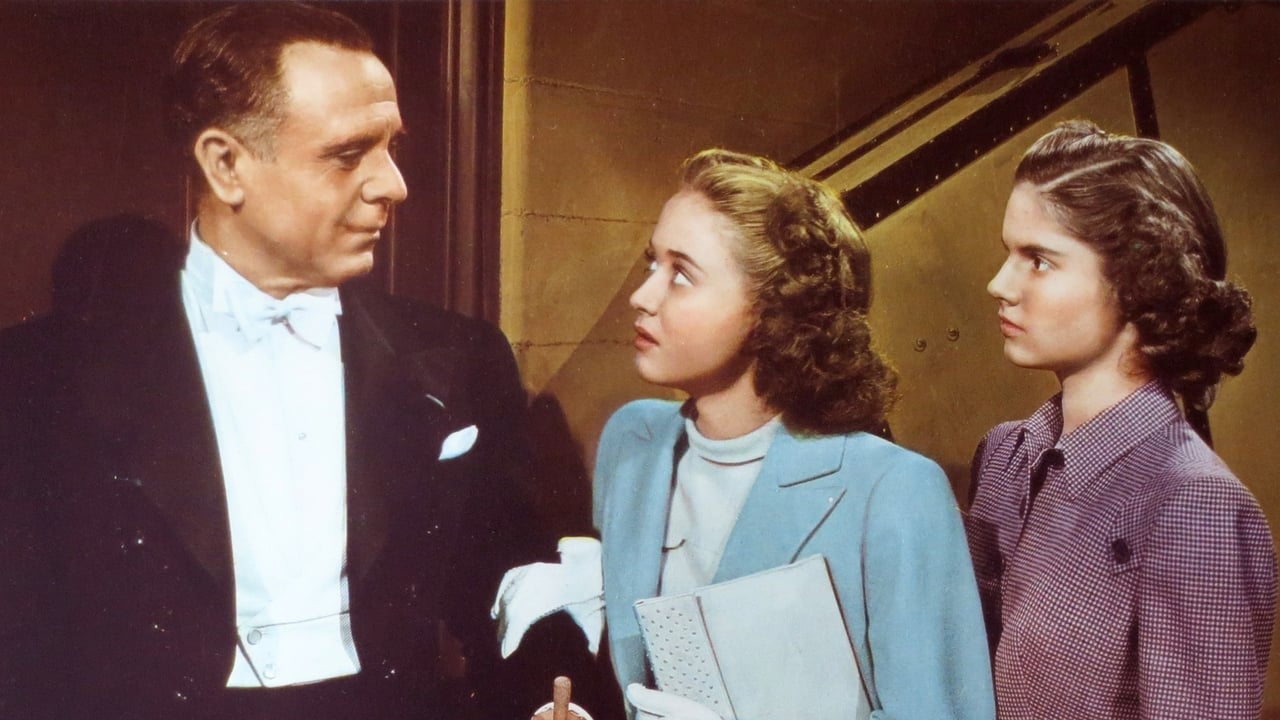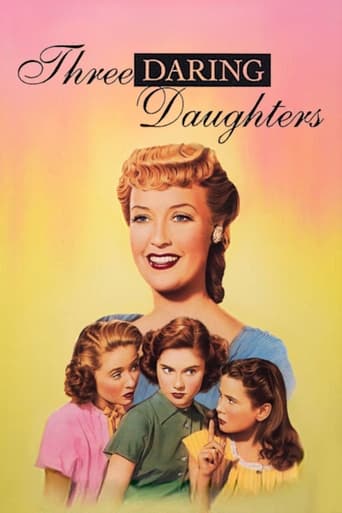Intcatinfo
A Masterpiece!
TrueHello
Fun premise, good actors, bad writing. This film seemed to have potential at the beginning but it quickly devolves into a trite action film. Ultimately it's very boring.
Brennan Camacho
Mostly, the movie is committed to the value of a good time.
Frances Chung
Through painfully honest and emotional moments, the movie becomes irresistibly relatable
JohnHowardReid
Copyright 22 January 1948 by Loew's Inc. A Metro-Goldwyn-Mayer Picture. New York opening at the Capitol: 12 February 1948. U.S. release: March 1948. U.K. release: Not recorded (announced for possible December 1947 opening). Australian release: 8 April 1948. Cut to 10,354 feet or 115 minutes in Australia. 119 minutes. U.K. release title: The BIRDS AND THE BEES.SYNOPSIS: We are asked to believe that a very attractive fashion magazine editor (where have we seen this character before? Answer: Lady in the Dark) is so light of brain that she has brought her three teenage daughters up to believe their estranged father is a fine man who will return to them some day, even though (a) he's been gone at least twelve years and (b) in actual fact he's a heel she was glad to divorce. (Where does this plot hail from? Answer: Mostly from producer Pasternak's own Three Smart Girls).
NOTES: The stage play opened at the Cort on 26 September 1946 and was yanked after only 28 performances. Barbara Robbins played Louise Morgan. The daughters were enacted by Sybil Stocking, Rosemary Rice and Joyce Patten. Although panned by all New York's influential critics (except Wanda Hale of the Daily News), the movie did mighty well at the domestic box-office, achieving 28th position for the year. Overseas, however, the movie bombed. Significantly it was one of the few MacDonald movies not re-issued by M-G-M in response to the great Jeanette MacDonald revival of the late 1950s, even though prints were available. (The other films that fell into this category were Broadway Serenade, Cairo and I Married an Angel which were packaged for television instead). COMMENT: A disappointment all around. There so many things wrong with the movie, it's hard to know where to begin. Let's just say that Miss MacDonald (often beautifully gowned) struggles gamely with both the unbelievably sudsy yet sexless character she's forced to enact in this incredibly vapid script plus a diverse collection of players headed by Jose Iturbi and Jane Powell who offer her little or no support. Flat, disinterested direction by Fred Wilcox doesn't help either. To his credit, producer Pasternak wanted Deanna Durbin for the Powell role, but Universal refused to loan her out. Although the screenplay was then re-written for Powell, she makes an poor substitute. What's worse, she's very ineptly recorded here. She doesn't sing so much as screech. At least Jeanette MacDonald's songs are more faithfully rendered, but acting-wise, she is stuck opposite the egotistic Iturbi, who not only stupidly insisted on using his real name for what is a character part (thus creating audience irritation and confusion), but on making believe that he conducted the M-G-M studio orchestra from his piano. In actual fact, of course, Georgie Stoll conducted. Despite his competent piano-playing, Iturbi is such a thorough pain-in-the-neck, he builds up little sympathy. OTHER VIEWS: A thin, crawling story of mother love and second romance which leaves one bleary-eyed and exhausted from bright colors and dull, girlish talk. - New York Herald Tribune.
w22nuschler
This story is dominated by Jeanette Macdonald and Jose Iturbi for the first half of the film. Jeanette plays the divorced mother of three daughters led by Jane Powell. Their father was a deadbeat, but mother paints a brighter picture of them for her daughters. She needs a vacation away from the daughters. She takes a cruise and meets Jose Iturbi and they fall in love and marry. Meanwhile, the daughters believe they can help her by bringing back their father. They tell their mother when she arrives that he is coming. She loses it and scolds them. They are sad and not sure what they did wrong. Jose shows up and Jane is happy when he tells her he is Jose Iturbi(he is playing himself). She drops a line about her father coming home and he gets a lump in his throat and tries to leave(funny scene). The make him stay and he implies he is there to give Jane a tryout. Mother walks in and they keep the truth from the daughters. Later they tell them together and the girls want their real dad. The man they went to to get their father back, sets them straight. They apologize to their mother. Mother also apologizes and admits she should have told them the truth about their real father. The girls go to see Iturbi and tell him they want him back. The final scene has the man who the girls originally saw to get their real father back, reuniting mother with Iturbi and the girls. A real nice ending to a good film.
gkeith_1
I am a soprano, so I like seeing movies with Jeanette MacDonald and Jane Powell. I enjoyed seeing the young Elinor Donahue; what a nice surprise. Movie shows working mother putting in lots of hours for her daughters, and even becoming ill and not attending the graduation. The mother deserves to be happy, but the girls tend to be selfish and never realize mama needs a life of her own. Their noses are certainly out of joint when mother gets remarried. They pull the usual "rude to the new step-parent" routine, but all gets resolved later. I enjoyed seeing Jose Iturbi being a major character, and not just a famous bandleader in the background like in some of his other movies.10/10
chakarlu
"Three Daring Daughters" is a sickly sweet, rose-colored look at divorce, remarriage, and single-parent living. Obviously, social issues and economic difficulty have no place in the picture perfect life of a single parent mother who feels exhausted, takes a cruise, and then dates and marries a band conductor. Even when the "its just a movie" phrase excuses the script from addressing real-life problems, 'Daughters' suffers from too many incoherent high-note songs, children whose personalities are not based on real children and band leader Hose Iturbi playing himself. Isn't it bizarre that any real person would star in a film in which their supposed real self gets married? Admittedly, this movie was released in the nineteen forties. Only a love for old style Hollywood romance and comedy could make 'Daughters' a tolerable film.

